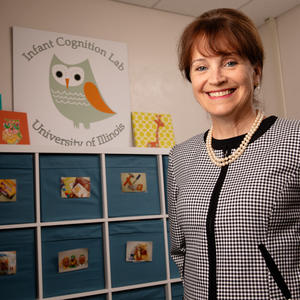Research Description
Dr. Baillargeon's research focuses on early causal reasoning in four core domains: physical reasoning, psychological reasoning, biological reasoning, and sociomoral reasoning. She assumes that each domain is equipped with a skeletal explanatory framework that enables infants to reason and learn about events in the domain. In her research on physical reasoning, Dr. Baillargeon examines infants' ability to predict and interpret the outcomes of physical events. Primary questions include: What expectations do infants possess at different ages about various simple physical events (e.g., occlusion, containment, and support events), and how do they attain these expectations? In her research on psychological reasoning, Dr. Baillargeon has been exploring infants' ability to predict and interpret the actions of agents. Primary questions include: Under what conditions do infants take into account the goals, dispositions, perceptions, and beliefs of agents to predict their actions? Of particular interest here is whether infants can attribute false beliefs to others, and the implications of such attributions for theory and research on the development of children's "theory of mind". In her research on biological reasoning, Dr. Baillargeon examines whether infants merely view animals as self-propelled agents, or whether they already hold biological expectations about animals. Primary questions include: Do infants expect animals to have filled insides, and do they view these insides as critical for animals’ functioning? Finally, in her research on sociomoral reasoning, Dr. Baillargeon is exploring what principles guide infants’ expectations about how individuals should act toward others. In this work, she has been focusing on the principles of fairness, harm avoidance, ingroup support, and authority.
For more information and a complete list of publications, please visit: Infant Cognition Lab
Education
Ph.D., University of Pennsylvania
Additional Campus Affiliations
Affiliate, Center for Social & Behavioral Science
External Links
Recent Publications
Jin, K. S., Ting, F., He, Z., & Baillargeon, R. (2024). Infants expect some degree of positive and negative reciprocity between strangers. Nature communications, 15(1), Article 7742. https://doi.org/10.1038/s41467-024-51982-7
Lin, Y., Stavans, M., Li, X., & Baillargeon, R. (2024). Infants can use temporary or scant categorical information to individuate objects. Cognitive Psychology, 149, Article 101640. https://doi.org/10.1016/j.cogpsych.2024.101640
Margoni, F., Surian, L., & Baillargeon, R. (2023). The Violation-of-Expectation Paradigm: A Conceptual Overview. Psychological review, 131(3), 716-748. https://doi.org/10.1037/rev0000450
Bian, L., & Baillargeon, R. (2022). When Are Similar Individuals a Group? Early Reasoning About Similarity and In-Group Support. Psychological Science, 33(5), 752-764. https://doi.org/10.1177/09567976211055185
Choi, Y., Luo, Y., & Baillargeon, R. (2022). Can 5-month-old infants consider the perspective of a novel eyeless agent? New evidence for early mentalistic reasoning. Child development, 93(2), 571-581. https://doi.org/10.1111/cdev.13707


